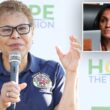James Van Der Beek is sharing the subtle colorectal cancer symptom he ignored before his shocking diagnosis.
“There wasn’t any red flag or something glaring,” he told Healthline this week.
The 48-year-old “Dawson’s Creek” alum publicly shared the news of his diagnosis last November.
“Before my diagnosis, I didn’t know much about colorectal cancer. I didn’t even realize the screening age dropped to 45; I thought it was still 50.”
Rates of colon cancer among young people have been steadily rising over the past three decades, even as diagnoses among older people decline. A staggering 20% of colorectal cancer cases in 2019 were discovered in people younger than 55, up from 11% in 1995.
Prior to his diagnosis, Van Der Beek noticed a change in his bowel movements, which he attributed to his coffee consumption.
“I thought maybe I needed to stop coffee,” he told People last year. “Or maybe not put cream in the coffee. But when I cut that out and it didn’t improve, I thought, ‘All right, I better get this checked out.’”
A colonoscopy confirmed that the actor had stage 3 colon cancer.
Common colorectal cancer symptoms
Changes in bowel movement are among the six telltale signs of colorectal cancer. Experts maintain that a tumor in the colon or rectum will, similar to “a clog in a pipe,” alter bathroom habits.
These changes can include frequent constipation, diarrhea or both. In many cases, patients don’t feel “empty” after going number 2 or notice that their stools look different.
One possible symptom among colon cancer patients is pencil-thin poop. This defining defecation tends to present if tumors are present near the end of the colon or line the inside of the organ, as it narrows whatever stool passes through.
Others include fatigue, anemia, unexplained weight loss, abdominal pain, and rectal bleeding.
Excluding skin cancers, colorectal cancer is the third most common cancer in the United States. The number of early-onset cases is on the rise, with diagnoses in people under 50 expected to double by 2030.
James Van Der Beek’s cancer advice
For his part and in the spirit of early detection, Van Der Beek has partnered with Guardant Health to raise awareness about the Shield blood test.
“What I love about the Shield test is it’s convenient, simple, FDA approved — it’s a simple blood draw and it could be done at your next doctor’s appointment.”
While colonoscopy is considered the standard test for colorectal cancer, blood tests like the one offered by shield are providing a different avenue for early detection.
“People are three times more likely to adhere to [screening] advice when it’s just a blood test. It’s convenient for people who either can’t take off work to do a colonoscopy or who [face] other barriers to some of the other testing methods,” said Van Der Beek.
According to the FDA a study showed Guardant’s Shield test detected 83% of colorectal cancers
“I really want to impress upon people that you don’t need symptoms to get screened. If you are 45 or older or have a family history, talk to your doctor about your screening options,” he said.
According to the Colon Cancer Alliance, 82% of young colon cancer survivors were initially misdiagnosed and 67% consulted at least two doctors before getting the right diagnosis.
And early detection equals increased surival.
The colon cancer mortality rate in people under 55 has been rising about 1% annually since the mid-2000s, while deaths among older adults have declined. This is partly due to the fact that cancer in younger people is often detected at more advanced stages, according to the American Cancer Society.
In regards to prevention and early detection, Van Der Beek shared, “I feel like it’s a big part of my healing process to spread the word and to help anybody I can from having to go through what I have been through.”








